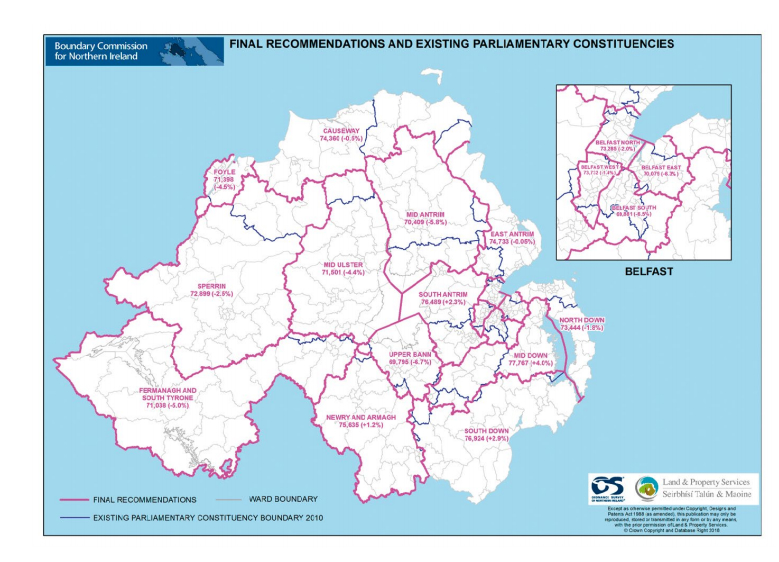
Proposals to split a town into three voting zones have been dropped as the final revised Westminster boundaries for Northern Ireland were published.
Changes will reduce the number of constituencies from 18 to 17, part of a wider reform to reduce MPs from 650 to 600.
Largely nationalist Dungiven in Co Londonderry was to be divided between three constituencies but the Boundary Commission for Northern Ireland recommended that the ward be transferred in its entirety from Mid Ulster to Sperrin constituency.
Almost 10,000 petition signatures and letters were received by the organisation responsible for drawing up a new Northern Ireland constituencies map.

Final parliamentary boundaries were approved and published by the Government on Monday, largely as anticipated with only two changes, to Dungiven and the predominantly rural area of Mallusk on the outskirts of north Belfast.
On Dungiven, the Commission said: “We accept that this is an arguable point and acknowledge the weight of public support for it.”
The old West Tyrone constituency will be renamed Sperrin.
The Commission added: “A compromise solution is possible which would not require any wards to be split, namely to transfer Dungiven ward from Mid Ulster to Sperrin.”
Belfast retains its four constituencies.
The Commission said: “Many argued that Mallusk ward should remain in South Antrim rather than being transferred to Belfast North.
“The main factors cited were to keep Mallusk within its existing constituency and to respect its predominantly rural character.
“We accept this argument and accordingly recommend that Mallusk should remain within the constituency of South Antrim.”
The Boundary Commission had to design new constituencies with populations as similarly-sized as possible.
Holywood in Co Down prompted objections to its transfer into the East Belfast seat as it could cut ties within the town itself, but the Commission said other options would raise significant new issues with neighbouring constituencies and rejected a change.
The Commission also ruled out a rethink in Mid Down, which had been suggested following concerns over local ties.


Comments: Our rules
We want our comments to be a lively and valuable part of our community - a place where readers can debate and engage with the most important local issues. The ability to comment on our stories is a privilege, not a right, however, and that privilege may be withdrawn if it is abused or misused.
Please report any comments that break our rules.
Read the rules here